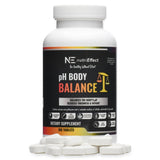The concept of pH balance in the human body is a topic of increasing interest in the health and wellness community. pH, which stands for 'potential of hydrogen,' is a measure of the acidity or alkalinity of a substance. The human body functions optimally when its pH is maintained at a slightly alkaline level, around 7.35 to 7.45. This balance is significantly influenced by diet, as different foods can affect the body's pH in various ways. This 1000-word article explores how dietary choices impact the body's pH levels and the overall implications for health.
Understanding pH and the Body
The pH scale ranges from 0 to 14, with 0 being highly acidic, 7 neutral, and 14 highly alkaline. The human body constantly regulates its pH level, primarily through the kidneys and lungs. The food we eat can either support this regulatory system or hinder it, depending on its acid or alkaline-forming properties.
Acidic vs. Alkaline Foods
Foods are categorized based on the effect they have on the body's pH. Acidic foods, such as meat, dairy, processed foods, and sugary snacks, tend to lower the pH, making the body more acidic. Alkaline foods, including most fruits, vegetables, nuts, and legumes, raise the body’s pH to a more alkaline level. It's important to note that a food's initial pH is not what determines its effect on the body. For instance, lemons are acidic but have an alkalizing effect once metabolized.
The Standard American Diet and Acidity
The Standard American Diet, high in processed foods, meat, and refined sugars, tends to be acid-forming. This diet can lead to a condition known as chronic low-grade acidosis, where the body is slightly more acidic than it should be. This imbalance can put stress on the body's regulatory systems and has been linked to various health issues, including osteoporosis, muscle wasting, and kidney stones.
The Benefits of an Alkaline Diet
An alkaline diet, rich in fruits, vegetables, nuts, and legumes, can help maintain a healthy pH balance. This diet has several potential health benefits:
- Improved Bone Health: A diet high in alkaline foods may help preserve bone density and muscle mass, reducing the risk of osteoporosis.
- Better Kidney Health: An alkaline diet can help reduce the strain on the kidneys by decreasing the need to filter out excess acid.
- Reduced Inflammation: Chronic inflammation, linked to many diseases, may be mitigated by an alkaline diet.
- Enhanced Energy Levels: Many people report increased energy and overall well-being when consuming a more alkaline diet.
Balancing pH Through Diet
Achieving a balanced pH through diet doesn't mean completely eliminating acidic foods. Instead, it's about creating a balance. Nutritionists often recommend a diet consisting of about 60-80% alkaline-forming foods and 20-40% acid-forming foods. This balance supports the body's natural pH regulation systems without excluding entire food groups.
The Role of Water
Hydration is crucial in maintaining pH balance. Drinking alkaline water, which has a higher pH level than regular tap water, can help neutralize acid levels in the body. However, water alone is not a solution; it should be part of a comprehensive approach that includes dietary changes.
The Alkaline Diet Controversy
While the benefits of an alkaline diet are supported by some health professionals, it's important to note that the scientific community is divided on this topic. Some experts argue that the body's pH is not significantly affected by diet, while others suggest that dietary changes can indeed influence pH balance and overall health.
Dietary Considerations
When considering an alkaline diet, it's important to ensure that it is balanced and nutritionally sound. Excluding entire food groups or excessively focusing on alkaline foods can lead to nutritional deficiencies. Consulting a nutritionist or healthcare professional is advisable when making significant dietary changes.
pH Testing and Monitoring
For those interested in monitoring their body's pH, urine and saliva tests are available. These tests can provide a general indication of pH levels, although they are not as accurate as blood tests. Regular testing can help individuals understand how their diet affects their body's pH and make informed dietary choices.
Conclusion
The impact of diet on the body's pH levels is a fascinating aspect of nutrition science. While the body has robust systems in place to regulate pH, dietary choices can support or hinder these processes. By understanding the effects of acidic and alkaline foods and striving for a balanced diet, individuals can promote optimal health and well-being. As research continues to evolve, the relationship between diet and pH balance will likely become clearer, offering more insights into how we can harness our diets for better health.








